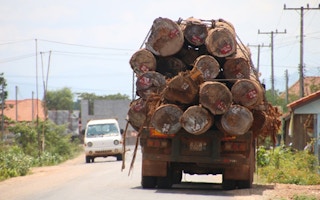State inspection authorities in Laos have seized more than two dozen trucks after they were found to be hauling timber illegally logged by the wife of the governor of Attapeu province for sale across the border in Vietnam, according to an official source.
The source, who inspects timber in the southern provinces of Laos, told RFA’s Lao Service Tuesday that the 27 trucks of logs owned by governor Nam Viyaketh’s wife Seng Viyaketh have been held since May at the Phoukeua International Border Checkpoint, which regulates crossings into western Vietnam’s Kon Tum province.
“The timber belongs to the governor [and was seized] while the trucks were being processed to pass the checkpoint to Vietnam,” said the official, who spoke on condition of anonymity.
“The officials inspected thoroughly and found that all the timber in the 27 trucks was illegal, so the president of the Government Inspection Authority, Bounthong Chitmany, ordered its seizure and appropriation by the state, though an auction has not yet been scheduled.”
“
I confirm that I am not involved in the seized timber—that is a rumor and is disparaging me.
Seng Viyaketh, wife of Laos governor Nam Viyaketh
Bounthong Chitmany is also the deputy prime minister of Laos, a high-ranking politburo member, and the head of the country’s Anti-Corruption Organisation.
The official said that the Prime Minister’s Office had also sent a notice to the State Inspection Authority on May 16 ordering it to send a unit to investigate the 27 trucks and seize them if their timber was found to have been illegally obtained.
Seng Viyaketh dismissed the accusation that she owned the illegally harvested timber seized in Attapeu in an interview with RFA on Thursday.
“I confirm that I am not involved in the seized timber—that is a rumor and disparaging me, so I am willing to be interviewed [to deny it],” she said.
“My answer is that this is groundless condemnation. Whoever said should show their evidence … because I have never run a timber business.”
An official who answered the phone at Attapeu’s Provincial Cabinet office Thursday said Nam Viyaketh was in a meeting and could not speak to RFA.
Vice chairman of the State Inspection Authority Xaikham Ounmany refused to comment on the seized trucks when contacted by RFA, while repeated calls to Khenthong Sisouvong, the vice governor of Attapeu province, rang unanswered.
Rampant corruption
High ranking officials in Attapeu are regularly involved in illegal logging and cross-border sales, despite a ban on the export of timber issued by Lao Prime Minister Thongloun Sisoulith in May last year as part of a bid to end rampant smuggling to China and Vietnam, where the wood is used to make high-end furniture.
“The smugglers must bribe officials from the top down,” the official said, adding that 22-wheel trucks must pay US $60,000 and 12-wheel trucks pay U.S. $40,000 “so that they are allowed to bring timber out of the province.”
“The officials who take bribes are from the departments of commerce, forest, public works and transport, custom and tax, and the provincial cabinet office. These are the officials who facilitate the smuggling.”
According to the official, some 10,000 cubic meters (353,150 cubic feet) of illegally harvested timber seized from smugglers in Attapeu province this year has gone missing, likely the result of local authorities looking the other way or actively selling the wood on the black market.
At least 16,000 cubic meters (565,050 cubic feet) of illegally harvested timber was seized from smugglers in Attapeu’s Sanamxay district alone in 2016, he said, but the State Inspection Authority announced earlier this year that only 3,600 cubic meters (127,150 cubic feet) had been seized throughout the entire province.
Forests under threat
Deforestation has been a major problem in the last two decades for Laos, where forests now cover less than 40 per cent of the country’s land, according to the Lao Ministry of Natural Resources and the Environment.
Much of the illegal timber is obtained through conversion forestry—clearing areas marked for the development of infrastructure projects such as hydropower dams, road building, and mining operations—which is used as an excuse for large-scale logging that otherwise would not be permitted under Lao law.
In December, sources told RFA that timber seized by authorities in Laos after being harvested illegally is being offered for sale in state-run auctions, but discrepancies remain in the number of logs being sold and the number of trees cut down.
A civil society organisation official working in Champassak province said at the time that governors in the country’s central and southern provinces regularly “enrich themselves by running sawmills and timber businesses in cooperation with Vietnamese investors.”
He said that the provinces don’t reveal the numbers of logs that have been seized, suggesting “something is being hidden under the carpet.”
“Governors have helped investors hide the confiscated timber ever since the national government began taking measures to stop the logging, and the number of seized logs never matches the number of trees cut down,” he said.
Reported and translated by Ounkeo Souksavanh. Written in English by Joshua Lipes.
Copyright © 1998-2014. Used with permission of Radio Free Asia, 2025 M St. NW, Suite 300, Washington DC 20036.








